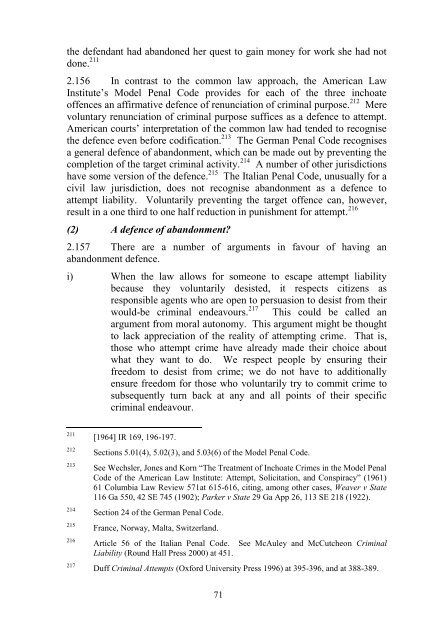Consultation Paper on Inchoate Offences - Law Reform Commission
Consultation Paper on Inchoate Offences - Law Reform Commission
Consultation Paper on Inchoate Offences - Law Reform Commission
Create successful ePaper yourself
Turn your PDF publications into a flip-book with our unique Google optimized e-Paper software.
the defendant had aband<strong>on</strong>ed her quest to gain m<strong>on</strong>ey for work she had notd<strong>on</strong>e. 2112.156 In c<strong>on</strong>trast to the comm<strong>on</strong> law approach, the American <strong>Law</strong>Institute‟s Model Penal Code provides for each of the three inchoateoffences an affirmative defence of renunciati<strong>on</strong> of criminal purpose. 212 Merevoluntary renunciati<strong>on</strong> of criminal purpose suffices as a defence to attempt.American courts‟ interpretati<strong>on</strong> of the comm<strong>on</strong> law had tended to recognisethe defence even before codificati<strong>on</strong>. 213 The German Penal Code recognisesa general defence of aband<strong>on</strong>ment, which can be made out by preventing thecompleti<strong>on</strong> of the target criminal activity. 214 A number of other jurisdicti<strong>on</strong>shave some versi<strong>on</strong> of the defence. 215 The Italian Penal Code, unusually for acivil law jurisdicti<strong>on</strong>, does not recognise aband<strong>on</strong>ment as a defence toattempt liability. Voluntarily preventing the target offence can, however,result in a <strong>on</strong>e third to <strong>on</strong>e half reducti<strong>on</strong> in punishment for attempt. 216(2) A defence of aband<strong>on</strong>ment?2.157 There are a number of arguments in favour of having anaband<strong>on</strong>ment defence.i) When the law allows for some<strong>on</strong>e to escape attempt liabilitybecause they voluntarily desisted, it respects citizens asresp<strong>on</strong>sible agents who are open to persuasi<strong>on</strong> to desist from theirwould-be criminal endeavours. 217 This could be called anargument from moral aut<strong>on</strong>omy. This argument might be thoughtto lack appreciati<strong>on</strong> of the reality of attempting crime. That is,those who attempt crime have already made their choice aboutwhat they want to do. We respect people by ensuring theirfreedom to desist from crime; we do not have to additi<strong>on</strong>allyensure freedom for those who voluntarily try to commit crime tosubsequently turn back at any and all points of their specificcriminal endeavour.211212213214215216217[1964] IR 169, 196-197.Secti<strong>on</strong>s 5.01(4), 5.02(3), and 5.03(6) of the Model Penal Code.See Wechsler, J<strong>on</strong>es and Korn “The Treatment of <strong>Inchoate</strong> Crimes in the Model PenalCode of the American <strong>Law</strong> Institute: Attempt, Solicitati<strong>on</strong>, and C<strong>on</strong>spiracy” (1961)61 Columbia <strong>Law</strong> Review 571at 615-616, citing, am<strong>on</strong>g other cases, Weaver v State116 Ga 550, 42 SE 745 (1902); Parker v State 29 Ga App 26, 113 SE 218 (1922).Secti<strong>on</strong> 24 of the German Penal Code.France, Norway, Malta, Switzerland.Article 56 of the Italian Penal Code. See McAuley and McCutche<strong>on</strong> CriminalLiability (Round Hall Press 2000) at 451.Duff Criminal Attempts (Oxford University Press 1996) at 395-396, and at 388-389.71
















